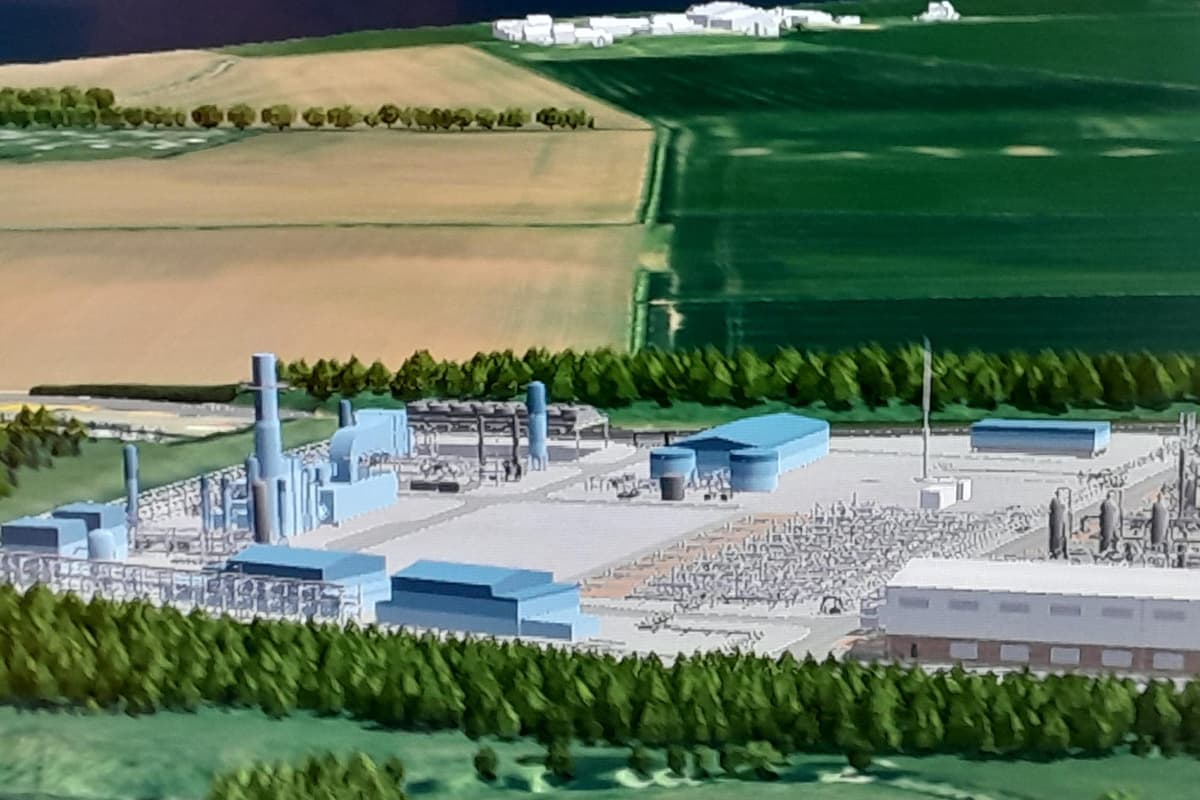SSE Thermal’s £350m to £400m 50MW project would see hydrogen produced and stored at a site near Aldbrough on Yorkshire’s coast before being used to power a turbine to create electricity to feed into the grid at times of peak demand.
One of the main challenges with intermittent renewables like offshore wind is how to store the excess energy - hydrogen is an alternative to batteries.
Hydrogen would be manufactured using “low carbon” electricity, delivered via an existing substation at the site, to split water into its component parts.
It would then be stored in an underground cavern 1.8 kilometres down in a layer of rock salt, previously used to store natural gas.
…
Residents at an event at Aldbrough on Thursday were told it would be the “first power station at this scale in the UK and pretty much the world”.
Attendees were able to see what the site will look like from any chosen viewpoint nearby using an interactive tool.
Some were dismayed by its size and concerned by creeping industrialisation of the coastline - it will have a 30m high stack and the turbine will be 14m high.
One resident said it will “look like a chemical factory” and was a “lot bigger” than she’d anticipated.



Natural gas burns, but hydrogen explodes.
This is a mistake.
Pump water uphill instead.
Gas can explode too, it’s just we’re so used to it that the danger is no longer immediately apparent to the average person. Sure hydrogen has it’s risks, but you’re not going to get the same output from letting a load of water run down a hill.
No. Desperately misleading.
That’s like saying that Biden says untrue things too, not just Trump. There’s an incredible difference in scale, and lying is very normal behaviour for Trump.
(Also, everyone knows natural gas can explode, it’s just that the danger is actually pretty low.)
https://en.m.wikipedia.org/wiki/Hydrogen_safety
Natural gas burns in ratios only up to under 20%, whereas Hydrogen burns in ratios well over 95%, maybe up to 97% and down to about 4% meaning that you need hardly any oxygen at the top end and hardly any hydrogen at the bottom end for an explosion - so it’s easy to get it lit and the whole lot goes up at once. Usually, not in rare cases. If you have a hydrogen leak, you have a high potential for oxygen ingress and you need vanishingly small amounts of oxygen for the whole lot to go up at once. That’s what an explosion is.
That’s what I meant by natural gas burning - that’s its normal behaviour when you pipe it somewhere and light it at the exit. Where it meets the air, it burns, but that burning doesn’t spread through your pipe or container unless your pipe or container has become mainly air. By contrast, it’s very hard indeed to consistently have a controlled burn of hydrogen over decades without a large scale explosion, but with natural gas that’s nowhere near as hard.
Hydrogen is low carbon, but it’s incredibly dangerous. There are far better low carbon energy solutions that actually work and aren’t as catastrophically dangerous. DO NOT get a hydrogen car if they ever make one. DO NOT get hydrogen piped into your home if they’re ever stupid enough to attempt this.
Hydrogen looks like a good solution if you’re a fossil fuel company - your customers are buying a product that you can label as environmentally friendly while you generate it as usual by burning high carbon fossil fuels. What you don’t want if you’re a fossil fuel company is solutions where you’re irrelevant like solar, batteries, hydro, and the cheapest energy of all - wind.
Tell that to Canada!
Hydrogen has a higher energy density, very much so, yes, but that’s a silly argument against using water and gravity for electricity generation.